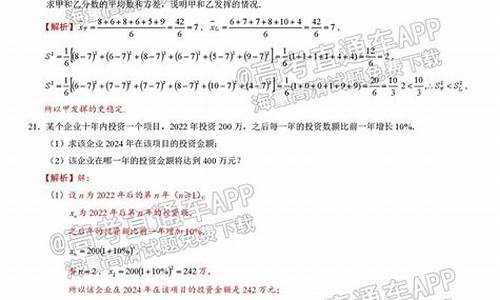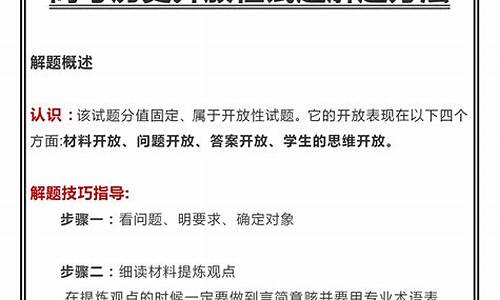您现在的位置是: 首页 > 教育政策 教育政策
高考不可数名词有哪些_高考不可数名词
tamoadmin 2024-07-11 人已围观
简介1.高考英语语法: 英语名词的可数性2.上海高考 英语语法3.高考英语词汇详解:pain的用法整理4.高考英语完形填空常考单词5.2008高考英语必会词汇精讲系列-H6.容易混淆的高考英语词汇是的。news(新闻),information(消息),furniture(家具),homework(家庭作业),housework(家务活),advice(建议)都是不可数名词,而且高考很常考这些哦望采纳,
1.高考英语语法: 英语名词的可数性
2.上海高考 英语语法
3.高考英语词汇详解:pain的用法整理
4.高考英语完形填空常考单词
5.2008高考英语必会词汇精讲系列-H
6.容易混淆的高考英语词汇

是的。news(新闻),information(消息),furniture(家具),homework(家庭作业),housework(家务活),advice(建议)都是不可数名词,而且高考很常考这些哦
望采纳,O(∩_∩)O谢谢
高考英语语法: 英语名词的可数性
为了让大家熟悉高考英语名词考点,能在考试中取得高分。下面由我为你提供的,希望能帮到你。
一
1. I found her sitting in the corner, reading _____ newspaper, with _____ in her eyes.
A. a, tear B. a piece of, tears C. a, tears D. a piece of, tear
陷阱误选D,许多学生错误地认为,既然news***讯息***和 paper***纸***均为不可数名词,那么newspaper***报纸***也应是不可数的;同时认为“眼泪”即“泪水”,“水”不可数,“泪水”和“眼泪”也应该不可数。
分析最佳答案为C。newspaper和 tear均为可数名词,它们不仅可以连用不定冠词、可以用复数,而且还可以连用数词。
Her eyes filled with tears. 她热泪盈眶。
She dried her tears with a handkerchief. 她用手帕擦干了眼泪。
The newspapers were full of lies. 报纸上一片谎言。
A newspaper is a publication. 报纸是一种出版物。
若不是将 newspaper 当作是供阅读或传递资讯的一种东西,而只是把它当成一种“纸”来看待,也可用作不可数名词,如:
Wrap it in ***a sheet of*** newspaper. 把它用张报纸包起来。
2. Her father works as a ______ in a hotel and her mother a ______ in a private pany.
A. cooker, typewriter B. cook, typist C. cooker, typist D. cook, typewriter
陷阱误选A,许多同学想当然地认为:cook 用作动词,表示“煮饭”,所以 cooker 应是其相应的名词,表示“煮饭的人”,即“厨师”;type 用作动词,表示“打字”,所以 typewriter 应表示“打字员”。
分析而事实是:cook=厨师,cooker=炊具;typist=打字员,typewriter=打字机。即此题正确答案为B。
3. “Why couldn’t they meet us at five o’clock?” “Because they were delayed by ________.”
A. heavy traffic B. heavy traffics C. crowded traffic D. crowded traffics
陷阱B、C、D三项均容易误选。
分析对于此题,首先要明确traffic为不可数名词,没有复数形式,故排除B和D。另外,汉语习惯说“交通拥挤”,而英语习惯上却不能用crowded 来修饰 traffic,要表示汉语的“交通拥挤”,英语通常说heavy traffic,即选A。如下面一题也是选A:
She is not a petent driver and can’t cope with driving in _______.
A. heavy traffic B. heavy traffics
C. crowded traffic D. crowded traffics
4. In fact, _______ one cause that leads to the problem.
A. cattle is B. cattle are C. cattles are D. the cattles are
陷阱此题容易误选A,想当然地认为cattle是单数,并且空格有表单数的one,自然谓语动词用is。
陷阱其实,正确答案为B。cattle***牲畜,牛***为 *** 名词,尽管它不带复数词尾-s,却永远表示复数意义,若用作主语,谓语要用复数。又如:
For this many cattle were killed. 为此宰了不少牲畜。
The prisoners were herded like cattle. 囚犯像牲口一样被赶到一起。
类似地,police***警察***,people***人***,police***警察***,poultry***家禽***等也具有同样用法,即只有单数形式,但却表示复数意义;用作主语时谓语通常也用复数;不与 a***n*** 连用,但可与the连用***表示总括意义和特指***。如:
The poultry have been fed. 家禽已经喂过饲料了。
In Britain police do not usually carry guns. 在英国警察通常不带枪。
It annoys me when people forget to say “thank you”。 遇到有人忘记道谢的时候,我就不痛快。
5. By all _______, you must try every _______ to help him.
A. mean, mean B. means, means C. means, mean D. mean, means
陷阱误选C,认为第一空前有all修饰,故用means,而第二空前有every修饰,故用mean。
分析其实,means是一个单复数同形的名词,并且永远带有尾-s。换句话说,在表示“方式”、“方法”时,不存在mean这一形式***mean主要用作动词,表示“意思是”;也可用作名词,表示“中间”、“中庸”***。此题正确答案为C,by all means为习语,意为“一定”、“尽一切办法”。means用作主语时,其谓语的数需根据句意来确定。比较:
All possible means have been tried. 所有可能的办法都已经试过了。
Every possible means has been tried. 每种可能的办法都已经试过了。
若句意不能明确地表明主语的单复数,其谓语则用单数或复数均可。如:
Is [Are] there any other means of getting more money? 还有其他什么办法可弄到更多钱吗?
二
6. Jim is ______ person, and everyone is willing to be ______ with him.
A. so kind a, friends B. so a kind, friends C. so kind a, friend D. so a kind, friend
陷阱误选C或D。认为 friend要用单数。
分析其实此题最佳答案为A。so kind a person相当于such a kind person,注意两者中冠词的位置不同。be friends with是习语,意为“与……友好”、“跟……做朋友”,与之同义的类似地还有make friends with。值得说明的是,这类短语中的名词总是用复数,即使句子主语为单数也是如此。如:
He is friends with me. 他与我是朋友。
He has made friends with everyone here. 他与这儿的每个人交上了朋友。
7. We already have ______ pencils, but we need two ______ pens.
A. dozen of, dozen B. dozens of, dozens C. dozens of, dozen D. dozens of, dozen of
陷阱误选 B。
分析此题最佳答案为C。关于dozen的复数是否加词尾-s的问题比较复杂,大致原则是:
***1*** 当它与具体数字连用时,既不加复数词尾-s,也不后接介词of。尽管有的词书也有 two dozen of 这样的用例,但这已属过时用法,在考试中应避免,如1992年全国高考有一道单项选择题就认为two dozen of为错误选项:
Shortly after the accident, _____ police were sent to the spot to keep order.
A. dozens of B. dozens C. dozen of D. dozen [D]
***2*** 当它不与具体数字连用,而是表示不确定的泛指数时,则不仅要加复数词尾-s,而且要后接介词 of,此时可将dozens of***许多,几十***视为习语。如:
I’ve been there dozens of times. 我去过那儿几十次。
She’s got dozens of boy-friends. 她的男朋友很多。
下面一例中的dozens加了复数词尾-s也属为似情况:
Pack them in dozens. 按打装袋吧。
***3*** 当与 a few, several 等数目不很具体的词连用时,加不加复数词尾-s均可,但需注意:不加复数词尾-s时,其后的介词of可以省略;加词尾-s时,其后介词 of不能省略。如:
several dozen ***of*** pencils=several dozens of pencils几打铅笔
注:英语较少使用many dozen的说法,要表示类似意思可用dozens of。
***4*** 当它后面的名词受 the, these, those 等特指限定词修饰时,或其后的接的是us, them这样的人称代词时,则此时必须用介词 of。如:
two dozen of these eggs 两打这种鸡蛋
three dozen of them 它们中的3打
注:score, hundred, thousand, million等也具有以上类似用法。
8. She raised her finger to her lips as _____ for silence.
A. an idea B. a mark C. a sign D. a word
陷阱容易误选B。
分析应选C,sign与mark的区别是:sign 的意思是“迹象”、“征兆”gesture or movement made with the hand, head, etc, used to give information, a mand, etc***用手或头等做出示意动作以传递资讯或命令等***,mark 的意思是 written or printed symbol or figure, line etc made as signor an indication of sth***书写与印刷的符号或图、线等记号***。
根据此二词的语义区别以及常识可知答案为C。类似地,下面两题的答案也是C:
***1*** Those black clouds are a sure _____ that it’s going to rain.
A. thing B. mark C. sign D. one
***2*** Just as a famous Chinese saying goes, a timely heavy snow is a ______ of good harvest next year.
A. mark B. track C. sign D. appearance
但是,下面一题却不能选sign,也不能选mark,而选symbol***象征***:
The lion is considered the king of the forest as it is a***n*** _____ of courage and power.
A. example B. sign
C. mark D. symbol
在近几年的高考中像这类结合词义区别以及语境和生活常识进行考查的试题经常出现,同学们需引起注意。
9. “May I take your order now?” “We’d like three black _______ and two green _______.”
A. coffee, cups of teas B. coffees, teas C. cups of coffee, tea D. cup of coffees, teas
陷阱误选C,认为coffee和tea均为不可数名词,不能后加复数词尾-s,从而排除选项A、B、D。
分析选B。有的同学认为 coffee 和tea是物质名词,不可数,不能用 three coffees, two teas 这样的表达。其实,coffee既可用作不可数名词,表示“咖啡”这种物质,也可用作可数名词,表示“一杯咖啡”,即在口语中 three coffees 就等于 three cups of coffee。同样,“三杯茶”既可说成 three cups of tea,也可说成 three teas;“三杯啤酒”既可说成 three glasses of beer,也可说成 three beers。
10. _____ is a good form of exercise for both young and old.
A. Walk B. Walking
C. The walk D. To walk
陷阱容易误选A或D。
分析最佳答案为B。分析如下:
***1*** 首先,选项D不如选项B佳,因为,不定式通常表示特定的动作,而动名词才表示习惯性的动作。
***2*** 尽管walk用作名词时可以表示“散步”,但它是可数名词,指的是一次一次的具体的散步,而不表示抽象意义或泛指意义的“散步”,要表示此义,要用动名词 walking。比较:
How about going for a walk? 出去散散步如何?
Walking does good to your health. 散步对你的健康有益。
类似地,dance 和 dancing 以及 swim 和 swimming 的区别也是一样:
***1*** 名词的 dance表示“跳舞”,是可数名词,指的是一次一次的具体的跳舞,而不表示抽象意义或泛指意义的“跳舞”,要表示后者的意思,要用动名词转化来的名词 dancing。比较:
Let’s have a dance. 我们跳曲舞吧。
He is interested in dancing. 他对跳舞感兴趣。
***2*** 名词的 swim表示“游泳”,是可数名词,指的是一次一次的具体的游泳,而不表示抽象意义或泛指意义的“游泳”,要表示后者的意思,要用动名词转化来的名词 swimming。比较:
She had a swim every day. 她每天游一会儿泳。
She loves swimming. 她喜欢游泳。
上海高考 英语语法
高考英语语法:英语名词的可数性
名词根据其可数性,可分为可数名词与不可数名词。一般说来,个体名词和大部分集合名词是可数的;而专有名词、物质名词、抽象名词以及少部分集合名词则通常是不可数的。但是这种区分只是大致的,原则性的,并不是绝对的。英语有些名词往往既是可数也可以是不可数的:
A:Would you like a cake? 要吃块蛋糕吗?
B:No, I don’t like cake. 不吃,我不喜欢吃蛋糕。
以上第一句用 a cake,这是把 cake 视为一块一块的“蛋糕”,所以它是可数的;而第二句只用 cake,这是把它当作物质名词看待, 所以它成了不可数名词。
下面我们按照名词的不同类别,分别讨论名词的可数性问题。
1. 专有名词的可数性
在通常情况下,专有名词具有“独一无二”的含义,因此它通常没有复数形式,即不可数。但是,专有名词的独一无二性通常是相对的,随着范围的扩大,这种独一无二性便会受到破坏。如在一个星期(week)内,只有一个星期六(Saturday), 一个星期日(Sunday)等,但是在一个月中甚至一年中,便有多个星期六,多个星期日了。所以我们有时可以说:
We have spent many happy Sundays there. 我们在那儿度过了许多个愉快的星期日。
又如,在一个小范围内,可能只有一个 Henry,但在一个较大的范围内则可能有多个 Henry, 因此我们有时会见到这样的句子:
There are five Henrys in our school. 我们学校有五个亨利。
另外,若专有名词转化成了普通名词,也可以是可数的:
Thousands of Lei Fengs have emerged in China. 中国涌现出了千千万万个雷锋。
2. 个体名词的可数性
个体名词表示的是一个一个的人或物的个体,所以它通常是可数的:
All of the students are interested in it. 所有的学生对此都很感兴趣。
There are trees on any side of the square. 广场的每一边都种有树。
3. 物质名词的可数性
由于物质名词在通常情况下不能分为个体,所以它通常是不可数的。但是,在某些特殊情况下(如表示种类等),有些物质名词也可以连用不定冠词或用复数形式:
wine 酒(不可数), a wine 一种酒(可数)
beer 啤酒(不可数), two beers 两杯啤酒(可数)
glass玻璃(不可数), some glasses 一些玻璃杯(可数)
4. 抽象名词的可数性
抽象名词是表示事物性质、行为、状态、感情等抽象概念的,因此它通常是不可数的。但是,有时抽象名词也可转化为具体名词(可数),表示具有某种性质的人或事物:
success 成功(不可数),a success 成功的人或事(可数)
pleasure 愉快(不可数),a pleasure 令人愉快的人或事(可数)
5. 集合名词的可数性
集合名词表示若干个体组成的集合体,它本身通常是可数的,其复数形式表示多个集合体:
a family 一个家庭,three families 三个家庭
a team 一个队, two teams 两个队
a crowd 一群人, crowds 多群人
高考英语词汇详解:pain的用法整理
你提到的这7个问题中,在我看来只有第6和第7题对高中生来说或许有点难度,多数不是单词本身的问题,而是用法问题,在校学生可能接触得相对较少,所以理解不透。
作为一个英语爱好者,下面我逐一说一下我的分析和理解:
1、这是名词是否可数的问题,问题的本质是“量词”要不要省。你的疑问其实在我的百度博客有详细阐述,看完估计你就明白了了,此处就不贴了,你自己去看“原创关于“可数名词”和“不可数名词”的再思考(2010年10月09日更新)”这篇文章。
2、其实你已经明白,全句的主语是those,本着一致性的原则,物主代词自然是their。
3、One原本是数词,但经常用作代词,说白了是省略用法,就是把重复的或前面提到过的名词中心词给省掉,由于经常这样用,one就被用作代词了。其中的道理应该跟你的第7问有点类似。
4、对于这一题,估计很多人会告诉你说tens of thousands of是固定短语、习惯用语、成语之类的,但这样子你还是死记,要想明白这个短语是怎么构造出来的。说白了是“数量单位+of”的句型嵌套,就好比复合句是句子嵌套句子。这个短语如何写成这样你就明白了:tens of (thousands of) sth.其中tens of表示“好几十的”,thousands of表示“好几千的”,合起来就是“好几十个千的,成千上万的”。
5、这题其实是最简单的,考的是英语思维,很多人总喜欢按汉语思维去思考英语问题(原本没错)但却经常因为对英语理解不透而错用。‘s和of类所有格表示的是“所有权、所属”关系,这个你从“所有格”这个名词翻译就能体会出来。tea pot中tea是修饰限制pot的用途或功能的,是名词直接作定语,二者没有所属关系。
6、这一题如果你知道those who的用法(其实你的第2问中的those of us who就是those who的具体化表达,等效于those who between us),那么就很容易选出those present。说到底,原因跟第3问中的one类似,those原本是形容词,按理后面应该跟名词中心词的,但经常把后面的中心词省掉,直接用those代替具有某个特征的对象。这在英语的用法中叫做“形容词的名词化”,这就是为什么语法书上说those还可以作代词用(代词pronoun在本质上可视为名词noun)。关于形容词的名词化用法,好像我的博客中也有说到,这是英语中超级常见的用法,如果要理解好英语是必须要掌握的。
7、这题考的是that的另类用法,按理英语中不应该出现“类似形容词功能”的指示代词当副词用的用法,这应该是英语在被世界各地的人的使用过程中跟本地语言想结合才产生的。汉语中就有“这么远、那么远”的说法,正规的英文说法是so far like this/that,因此,this/that far是一种不太规范的简化用法,但因为这样用的人多,大家也就将错就错了,另外,这样说起来也更简单。所以,还是用法的问题,至于此处为何用that而不用this,相信只要你知道这2个词的词义差别就知道答案了。
归结起来一句话,要学好英语一定不能总是“死记”,小学或初中阶段还勉强可以说得过去,毕竟词汇量少理解力差,到了高中特别是大学就必须学会“理解”英语,否则是学不好英语的。以上是个人的英语学习心得,供参考,欢迎交流。
高考英语完形填空常考单词
提要高考 : 2017高考英语词汇详解:pain的用法
高考英语词汇详解:pain的用法
一、表示肉体上的“痛”“疼痛”
1. 可数性问题:此时可用作可数或不可数名词。如:
This tooth is giving me pain. 这颗牙很疼。
Mary felt a sharp pain in her left arm. 玛丽左臂感到一阵剧烈的疼痛。
Chest pains may be symptomatic of heart disease. 胸痛可能是心脏病的症状。注:由于可用作可数或不可数名词,所以有时在同一语境中用pain, a pain, pains都是可能的。如:
I have pain [a pain, pains] in my back. 我背疼。
2. 修饰语问题:用作不可数名词,可用much, little等修饰;用作可数名词时,可用many, few等修饰。如:
Was it possible to have so much pain that it could no longer hurt? 痛得很厉害以至不再感到疼痛,这种情况可能吗?
After falling from a ladder, he had many physical aches and pains. 从上摔下来以后他感到身上到处都痛。
3. 主谓一致问题:pain用作主语时,谓语肯定用单数,这不是问题;当pains用作主语时,谓语通常用复数。如:
If the pains return phone the doctor. 如果疼痛再发作,打电话给医生。
Her pains are mostly pure imagination. 他的疼痛多半纯粹是想象出来的东西。
但是,有时也可用单数。如:
Growing pains refers to pains in the joints and muscles of growing children. 发育性疼痛乃指正在发育成长的`儿童的关节和肌肉所感到的疼痛。
二、表示精神上的“痛苦”
1. 可数性问题:此时只用作不可数名词,不用复数形式,也不与不定冠词连用。如:
I could not stand the pain any longer. 我再也忍受不了这种痛苦了。
I hope you will forgive me if I have given you pain.如果我给了你痛苦,希望你原谅我。
2. 修饰语问题:通常可用great, some, no, a great deal, much等修饰。如:
The memory of her mother’s illness caused her great pain. 想起妈妈的疾病她就感到痛苦。
His harsh words caused her much pain. 他说话很刺耳,她听了很不舒服。
It gave us much pain to learn of the sad news. 听到这个不幸的消息我们十分痛苦。
3. 主谓一致问题:由于不可数,用作主语时,自然要用单数谓语。
2008高考英语必会词汇精讲系列-H
高考英语完形填空常考单词
完形填空是高考英语中的一种题型,可以说是中学生最为棘手的题型之一。下面是我整理的高中英语完形填空常考单词,希望能帮到大家!
1、衣服
clothes统指各种衣服,谓语动词永远是复数
cloth指布,为不可数名词
clothing 服装的总称,指一件衣服,搭配a piece of, an article of
2、quiet, silent, still
quiet 安静的,可以发出小的声音;
silent 不发出声音,但可以动;
still 完全不动的,静止的,不动的`(He stand there still. )
3、before long, long before
before long 不久以后;
long before 很久以前;
例:not long before = before long
4、be about to, be going to, be to do+ when
be about to 表最近的将来,后面不接时间状语;
be going to 侧重打算,想法;
be to do 侧重意志,计划,安排 例:I?m to meet him.(含双方事先约好的意思)
5、bring, take, carry, fetch
bring 拿来;
take 带走;
carry 随身携带;
fetch 取,去回这一往返动作,例:fetch a box of chalk
6、参加
take part in参加(活动)
=join in=participate in参加
join 参加(组织,团体)
attend出席
attend to照顾
compete竞争
compete in 在?方面竞争
compete for为了?竞争
compete against 和?竞赛
7、控告
accuse sb. of sth指控某人
=charge sb. with sth控告某人做某事
8、敬佩/嫉妒
admire钦佩,羡慕,欣赏,赞美
respect尊重
show respect for对?表示尊重
respect sb for sth
adore 爱慕
envy v. 嫉妒
jealous adj. 嫉妒的
in honor of为了纪念,为了向?表示敬意
9、想/考虑
think of 考虑=think about
think of/consider+as +adj/n 把?看做
consider考虑
think over仔细考虑,慎重考虑
be concerned about担心,关心
10、in charge of, in the charge of
in charge of 管理,负责照料,例:He is in charge of the matter.
in the charge of 由?照料,例:The matter is in the charge of her.
15、in secret, in the secret
in secret 秘密地,暗自地,偷偷地,一般用作状语;
in the secret 知道内情,知道秘密,一般用作表语,My mother was in the secret from the beginning.
11、next year, the next year
next year 将来时间状语;
the next year 过去将来时间状语,例:He said he would go abroad the next year.
12、spend, take, pay, cost
spend 人做主语,花钱,花时间,sb spend 钱/时间on sth./(in) doing sth;
take 物做主语,花时间;it takes sb some time to do
pay 人做主语,花钱,sb pay (money) for sth;
cost 物做主语,花钱。sth cost sb 钱
13、join, join in, take part in
join 加入某个组织,并成为其中的一员,例:He joined the army five years ago.
join in 参加小型的活动,join sb. in
take part in 参加大型的活动。
14、the doctor and teacher, the doctor and the teacher
the doctor and teacher 指一个人,既是医生又是老师;
the doctor and the teacher 两个人,一个医生和一个老师。
;容易混淆的高考英语词汇
h
1、hair, a hair, hairs
hair指人或动物的?头发,毛发?。hair可指人或动物的全部?头发,毛发?,强调整体。作此解时,它是不可数名词。充当主语,用单数形式。如: what lovely hair the girl has!那女孩的头发真美! my mother's black hair was going gray.我妈妈的黑发正在变白。
a hair是指?一根头发或毛发?,此时的hair是可数名词的单数形式。如: i found a long golden hair on the tablecloth.我在桌布上发现一根金发。 the little boy has got a white hair on his head.这个小男孩的头上有一根白发。
hairs指?多根头发或毛发?,它是可数名词的复数形式,其前可有数词或表示数量的a few, several, many等词修饰。如: the cat has left its hairs all over my clothes.那只猫粘得我衣服上都是猫毛。 my aunt has a few gray hairs.我的婶婶已有几根白发。
2、hand on, on hand
hand on是一动副型短语动词,一般用作及物动词,表示?传下去;转交?等意思。例如:everyone in class should read this, so when you have finished, please hand it on.班上每个人都应把这看一下,所以你看完后,请往下传。that family trait is handed on from father to son.那种家风是父子相传的。would you hand on this telegram to your friend?你把这份电报转交给你的朋友好吗?
on hand是一习语,在句中作表语或状语,意为?现有在手头的;准备好了的?和?在近处,在手边;临近?等,含有即将来临的意味。例如:i am sorry i have no cash on hand.对不起,我手头没有现金。always have your dictionary on hand when you study.学习时要随时把词典放在手边。 soon school will end and vacation will be on hand.学期即将结束,假期就要来临。
3、happen, take place这两者都表示?发生?。
happen为?发生,(偶然)发生?,较多地用来指某个事件的突然发生,强调其偶然性,主语往往是事件,事故等一类的词汇。它也可后接动词不定式,及用于it happens that...结构,表示?碰巧?的意义。如: the road accident happened under my eyes.我亲眼目睹了这场交通事故。 i never know what's going to happen next.我永远不知道将会发生什么。 my cousin happened not to be at home.我的表兄碰巧不在家。 how does it happen that you know her?你怎么会碰巧认识她的?
take place为?发生,举行?,常指有计划安排的事情的发生与进行,不含偶然的意味。如: when does the popular concert take place? 这场流行音乐会几时开始? the talk is planned to take place in the great hall of the people on december 9. 这次会谈将定于十二月九日在人民大会堂举行。 the conversation with the principal of our school took place several hours ago. 这个由我校校长参加的会议是在几个小时前举行的。 great changes have taken place in our country since 1980. 自1980年以来,我们的国家发生了翻天覆地的变化。
在不强调偶然性与计划性的场合,两者有时可以通用。如: what has happened / taken place?发生了什么? the may fourth movement happened / took place in 1919.五四运动发生在1919年。
4、hanged, hung
动词hang的过去式和过去分词分别有两种形式,即hanged, hanged和hung, hung,但由于它们的意义不同,所以易引起混淆。hanged是动词hang作?绞杀,吊死?讲时的过去式或过去分词。例如:the judge sentenced the criminal to be hanged.法官判处罪犯绞刑。she hanged herself.她上吊死了。
hung是动词hang作 "悬、挂"的意思时的过去时或过去分词。例如:the hall is hung with red flags.大厅里挂着红旗。i hung the picture yesterday.我昨天把画挂了起来。
5、happen, happen to
happen是不及物动词,不能用于被动语态,其过去分词也不能用作形容词。它常指某事情,事故,故事等?发生?,主语往往为表示事物的名词或代词。此外,happen后亦可接动词不定式和that从句,表示?恰好,碰巧?的意思。后接动词不定式时,主语必须是表示人的名词或代词;其后若接that从句,常用it作形式主语,that从句作真正主语的结构形式,即it happens that... 。例如:many changes have happened in our country since liberation.解放以来,我国发生了很多变化。we happened to be only two miles short of the plant.当时我们恰好离厂只有两英里。it happened that she was there.恰好她在那儿。
happen to是一习语,意为?临到,发生于?,其中to是介词,后接表示人或事物的名词或代词,主语通常是anything, something, what等。例如:if anything happens to him, let me know.如果他发生意外,就通知我。what happened to the machine?机器出了什么毛病?
6、harm, hurt, injure, wound这一组动词均表示?伤害,损害?。
harm表示引起对身体,物质或精神上的严重损害,常指伤害人的肉体,损坏东西以及损害健康,品 质,事业等。如: hard drinking will harm your stomach.过量饮酒会伤胃。 i don't believe those fairy tales will harm our students. 我认为那些神话故事不会对我们的学生有害处。 there was a fire in the street, but the theatre wasn't harmed at all. 街上起火了,但是那家戏院完好无损。
hurt常指思想感情方面的伤害,含有引起极大苦恼之意。当指肉体上的伤害时,强调疼痛的剧烈程 度。hurt的过去分词只能作表语,不能作定语,而本组内的其他动词则无此限制。如: it hurts me when you talk like that.你那样同我说话,我很心痛。 my head still hurts.我的头仍然很疼。 she was hurt to think of her not being invited to the party. 一想到没被邀请去参加那个聚会,她就感到受到了伤害。
injure着重指人的容貌、内部器官、生理机能的损害,常与harm通用,但更强调伤势的严重。它也可指对人精神的伤害。如: you will injure yourself by smoking too much.过度抽烟对你的身体有害。 the boy injured his shoulder while playing football.在踢足球时,他弄伤了自己的肩部。 she was so injured in her pride that she rushed out into the dark street. 她的骄傲受到了伤害,所以她冲到了漆黑的大街上.
wound专指外力对身体造成的伤害,尤其指战争和灾害中的受伤,一般指外伤,不指内伤。它也可指感情,荣誉方面的创伤。如: the bullet wounded the soldier in the head.子弹击伤了这个战士的头部。 fifty pla men were wounded in the sea battle.在这场海战中,五十位人民解放军受了伤。 what you have said has seriously wounded the feeling of maggie. 你说的话伤透了麦琪的感情。
7、hard, hardly这两个词词义相近,不少人常常将hardly误作hard的副词。其实hard本身也可用作副词,并且它们的用法和意义完全不同。
hard既可作形容词,意为?勤奋的;困难的?等;亦可作副词,表示?拼命地,努力地?的意思。例如:this is a hard work.这是一项艰苦的工作。he worked hard when he was young.他年轻时,工作努力。
hardly只用作副词,意思是?几乎不,简直不?,它与seldom, scarcely等词一样,本身含有否定的意义,故在句中不能另加否定词。此外,hardly 位于句首时,该句采用倒装语序。例如:i hardly know what to say.我简直不知道说什么好。what he said was hardly true.他说的话不会是真的。hardly can i endure this weather.我简直受不了这天气。
8、have a word with, have words with
have a word with表示?和?谈谈,说几句话?的意思。这种谈话往往是不够充分详尽的,或者说是很随便的。例如:i'll have a word with you this afternoon.今天下午我要和你说几句。i had a chance to have a word with him when we met accidentally at the drugstore.上次我们在药店偶然相遇的时候,我有机会和他交谈了一下。
have words with用于贬义,表示?和?发生口角,与...争吵?的意思,相当于quarrel with 。例如:they had words with their neighbours over some trifles.他们因一些琐事与邻居发生口角。they've had words with each other, i hear.听说,他们发生过口角。
9、have, there be
have表示某人或某事物?拥有,具有,含有某人,某事物或某性质?,强调占有。如: the poor fellow had neither friends nor money.那个穷家伙既没有朋友也没有钱。 this sentence has two different meanings.这句话有两个不同的意思。 these two short stories have much in common.这两个小故事有很多相似之处。
there be表示某处?有?某人或某事物,强调存在。此结构中的there本身没有?在那里?的意思,需要 表达该意义时,句末须另加there。there be句型为倒装结构,谓语动词要和后面的主语保持人称与数上 的一致。当有几个并列的主语时,一般应以最靠近谓语动词的主语为准。此结构中还可以用助动词及情 态动词。如: there are exceptions to every rule.每个规则都有例外。 there was an apple tree and four pear trees in their courtyard. 他们的大庭院里有一棵苹果树和四棵梨树。 there used to be a chemical works there.那儿以前有个化工厂。 there can't be more than five or six hotels in this town. 在这个镇上,不可能有超过五六家宾馆。 let's get through the work quickly. there seems to be little time left. 我们赶快把工作完成,时间好像所剩无几。
10、have sth. done, have sb. do, have sb. doing
have sth. done主要有两种用法和意义:1. 表示?使(让,要,叫)某事被做?,强调主语意志,过去分词done所表示的动作由他人完成。2. 以主语为重点,意味着对主语不利的事,常有?遭受?的含意。此时,done所表示的动作执行者不明。在使用中,done由其他实义动作执行者代替。例如:i have my photograph taken.我(让人)照了个相。i had my watch repaired yesterday.我昨天(让人)把我的表修了。he had his arm broken.他的胳膊折断了。he had his house burnt down in the fire.他的房子在大火中烧光了。
have sb. do 和have sb. doing都用来表示?让(使)某人做某事?的意思,动词do和doing的动作均由sb.执行。这两个词组不同的是前者的do表示一般意义,而后者的doing则强调一直做某个动作。在使用中,do和doing可由其他实义动词代换。例如:i had him take my photograph.我让他给我照相。he had joe clean his shoes.他要乔给他擦鞋。try to have her speaking!设法让她继续说话。
11、have to, must
have to 和must 都可用来表示义务,有时可通用。前者比较强调客观需要,后者则着重说明主观看法, 表示个人的意志。试比较: you shall have to work hard if they want you to get it done this week. 如果他们要你这周完成这项工作的话,你就得努力工作。(表示外界条件的客观需要。) i must go there to help the poor. 我必须去帮助那些穷人们。(表示说话人自己的看法。) 在某些不需要强调这两种差别的场合,两者可以互相换用。如: i am afraid we have to / must leave now.我们恐怕必须得走了。
must还能表示一种揣测,作?一定,必定是?解,have to则无此意义。如: this must be the book you want. 这一定是你要的书。 he must have spent a long time writing this report. 他一定花了不少时间写这份报告。
容易混淆的高考英语词汇大全
在高考英语中,有很多易混易错英语词汇,很多人都搞不懂!下面我整理了一些容易混淆的高考英语词汇,希望能给大家提供一些帮助。
1. clothes, cloth, clothing
clothes统指各种衣服,谓语动词永远是复数, cloth指布,为不可数名词 clothing 服装的总称,指一件衣服用a piece of, an article of
2. amount, number
amount后接不可数名词, number后接可数名词 a number of students
3. sound, voice, noise
sound自然界各种各样的声音,voice人的嗓音,noise噪音I hate the loud noise outside.
4. cause, reason
cause 指造成某一事实或现象的直接原因,后接of sth./doing sth,reason用来解释某种现象或结果的理由,后接for sth./doing sth. the reason for being late
5. exercise, exercises, practice exercise运动,锻炼(不可数),exercises练习(可数),practice(反复做的)练习 Practice makes perfect.
6. officer, official
officer部队的军官,official政府官员 an army officer
7. work, job
二者均指工作。work不可数,job可数 a good job
8. cook, cooker
cook厨师,cooker厨具 He is a good cook.
9. problem, question
problem常和困难连系,前面的动词常为think about, solve, raise,question常和疑问连系,多和ask, answer连用
10. a number of, the number of
a number of许多,谓语动词用复数。the number of…的数目,谓语动词用单数。The number of students is increasing.
11. chick, chicken
二者均可指小鸡,chicken还可以当鸡肉 The chicken is delicious.
12. trip, journey, travel, voyage
travel是最常用的,trip指短期的旅途,journey指稍长的旅途,voyage指海上航行 a three-day trip
13. in front of, in the front of
in front of范围外的前面,in the front of范围内的前面 In the front of the room sits a boy.
14. three of us, the three of us
three of us我们(不止三个)中的`三个,the three of us我们三个(就三个人)The three of us---Tom, Jack and I went to the cinema.
15. by bus, on the bus
by bus表手段,方式,不用冠词,on the bus表范围 They went there by bus.
16. for a moment, for the moment
for a moment 片刻,一会儿,for the moment暂时,一时 Thinking for a moment, he agreed.
17. in a word, in words
in a word总之,一句话, in words口头上 In a word, you are right.
18. in place of, in the place of
in place of代替,in the place of在…地方 A new building is built in the place of the old one.
19. go to sea, by sea, by the sea
go to sea当海员,出航,by sea乘船,由海路, by the sea在海边 go by sea
20. the doctor and teacher, the doctor and the teacher
the doctor and teacher指一个人,既是医生又是老师,the doctor and the teacher两个人,一个医生和一个老师 the doctor and teacher is
21. in office, in the office
in office在职的,in the office在办公室里 He is in office, not out of office.
22. in charge of, in the charge of
in charge of管理,负责照料, in the charge of由……照料 He is in charge of the matter. The matter is in the charge of her.
23. out of question, out of the question
out of question毫无疑问的,out of the question不可能的
24. a second, the second
a second又一,再一,the second第…… He won the second prize.
25. by day, by the day
by day白天,by the day按天计算 The workers are paid by the day.
26. it, one
it同一物体,one同类不同一 I lost my pen. I have to buy a new one.
27. none, nothing, no one
none强调有多少,nothing, no one强调有没有,nothing指物,no one指人 --- How many…/How much…? --- None.
28. other, another
other后接名词复数,another后接名词单数 other students, another student
29. not a little, not a bit
not a little非常,not a bit一点也不 I'm not a bit tired. 我一点儿也不累。
30. many, much, a lot of
many和可数名词连用,much和不可数名词连用,a lot of可数,不可数均可,但不用于否定句 I haven't many books.
31. no, not
no=not a/any no friend=not a/any friend no water=not any water
32. no more than, not more than
no more than相当于only,仅仅,只有,not more than 至多,不超过
33. tall, high
tall常指人或动物,high常指物体 He is tall.
34. fast, quickly
fast侧重于指人或物体具有运动速度快的特点,quickly侧重指某事完成或发生的快 run fast, answer the question quickly
35. high, highly
high具体的高,highly抽象的高,高度的 think highly of
36. sleeping, asleep, sleepy
sleeping正在睡觉,asleep睡着,熟睡,只能做表语,sleepy困的,有睡意的 a sleeping baby The baby is asleep. I'm sleepy.
37. respectful, respectable
respectful尊敬,有礼貌,respectable可敬的,值得尊敬的 be respectful to the aged
38. pleasant, pleased, pleasing
pleasant常用作定语,pleased, pleasing常用作表语,pleased主语常为人,pleasing主语常为物 a pleasant trip The trip is pleasing.
39. close, closely
close接近,靠近,closely紧紧地,紧密地 closely connected, stand close
40. ill, sick
ill做表语,sick定,表均可 a sick boy
41. good, well
good形容词,well副词,但指身体状况是形容词 He is well again.
42. hard, hardly
hard努力,hardly几乎不 work hard I can hardly believe it.
43. late, lately
late迟,晚,lately最近,近来 I haven't seen him lately.
44. living, alive, live, lively
living, alive, live均为活着的,living定表均可,alive定表均可,定语后置,live只能做定语,lively意为活波的 all the living people=all the people alive
45. excited, exciting
excited使人兴奋的,exciting令人兴奋的 I'm excited. The news is exciting.
46. deep, deeply
deep具体的深,deeply抽象的深,深深地 deeply moved, dig deep
47. before long, long before
before long不久以后,long before很久以前 not long before = before long
48. instead, instead of
instead是副词,放在句首或句末,instead of是介词短语,放在句中He didn't see a film. Instead he watched TV. He watched TV instead of seeing a film.
49. too much, much too
too much 后接不可数名词,much too后接形容词 much too heavy
50. raise, rise
raise及物动词,rise不及物动词 The sun rises in the east.









